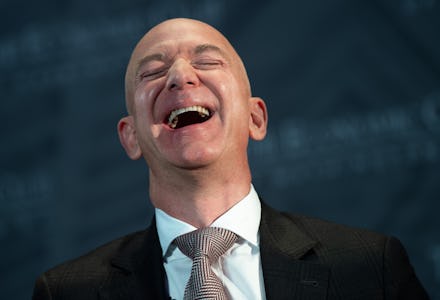Jeff Bezos is ready to sell you drugs

You receive a push notification on your phone. It says that it's time to refill your prescription. A second message follows, alerting you that as an Amazon Prime member, you're eligible for a discount if you have the life-alerting little chemical elixir in a gelatin capsule fulfilled by the conglomerate. No, it's not a story from the distant future. The year is 2020, and you're in hell.
Amazon announced on Tuesday that it’s launching Amazon Pharmacy, a digital drugstore that will allow shoppers to scoop up over-the-counter medications or get prescriptions filled. The service, which will be available through Amazon.com or the Amazon mobile app, will offer a discount on drugs to Amazon Prime subscribers, as well as free two-day delivery on orders from Amazon Pharmacy. That's right, getting your medication delivered in a timely manner and at a discount is now just a perk of being an Amazon customer, same as having access to the company's library of streaming video content.
Patients looking to use Dr. Bezos will be able to create what Amazon calls a "secure pharmacy profile," in which they can add insurance information, manage prescriptions, and set up payment options to pay for refills. The company is promising Prime subscribers "unlimited, free two-day delivery on orders from Amazon Pharmacy."
In addition, it's offering what appear to be steep discounts on medications when purchased without using insurance. Amazon Prime subscribers will get up to 80 percent off on generic versions of prescription drugs and up to 40 percent off name-brand medications when they pay Amazon directly rather than going through their insurance provider. That's around the same level of savings promised by services like GoodRx. On its platforms, Amazon will show customers price comparisons that will alert them when it's cheaper to get their prescription with insurance and when it's better to use Amazon's discounted rates. Amazon is also giving Prime customers an Rx card that can be presented at local pharmacies to get those same discounted prices without ordering directly from Amazon.
Amazon Pharmacy was an inevitability for a company that seemingly has to get its grubby hands on every business that can conceivably turn a profit. The writing has been on the wall for our dystopian future in which Amazon becomes our universal drug pusher since it acquired PillPack, an online pharmacy that was sold to Jeff Bezos' Cthulhuian conglomerate for $750 million, last year. It's sure to be another profit center for the company, seeing as the pharmaceutical industry is a trillion-dollar industry that produces massive returns for drug pushers.
Amazon already rakes in hundreds of billions of dollars being an industry leader in e-commerce, cloud computing, and grocery sales. It owns a seemingly endless number of assets that are fixtures in many peoples' lives. Whole Foods? Amazon. Twitch? That's Amazon, too. Want to listen to an audiobook? You're probably going through Amazon. Many of the online services and apps you use every single day? They run on Amazon Web Services. Getting away from Amazon entirely is effectively impossible.
What makes the existence of Amazon Pharmacy all the more infuriating is the fact that it is likely to get much of its profit thanks to our exceptionally broken and cruel healthcare industry. A Harvard study found that millions of Americans have skipped out on medications that they need because the cost is simply too high. Polling has found that as many as one in four Americans report that it's difficult to afford their prescriptions. America's healthcare system is failing millions of people. So as dystopian as Amazon stepping in and offering discounts to Prime subscribers is — and oh boy does it reek of late-stage capitalism — no one should be faulted for taking a discount where they can get one. 100 million households in the US have a Prime subscription. If they can get the medicine they need at cheaper prices, they absolutely should. It’s just that getting necessary medication shouldn't have to be reliant on subscribing to the right corporation's plan.